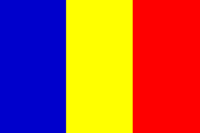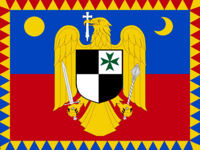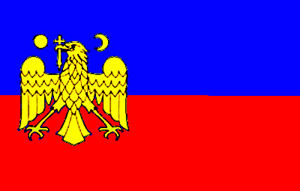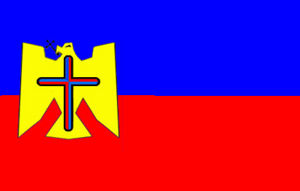Muntenia

| |

| |
| Subdivision of: | Romanian Federation, and Balkan Defense Agreement |
| Cities: | |
| Capital: | Bucureşti |
| Largest: | Bucureşti |
| Other: | Constanţa, Craiova, Piteşti, Galaţi, Brăila, Buzău, Tulcea |
| Languages: | |
| Official: | Romanian |
| Others: | Turkish, Bulgarian |
| Queen: | Elena I |
| Chancellor: | Gheorghe Raducioiu |
| Area: | 34,478 sq. mi. (75,520 sq.km.) |
| Population: | 7,781,905 (2004 census) |
| Established: | 1877, from Turkey |
Muntenia is one of the three constituents of the Romanian Federation.
Administration
Government
Muntenia is a constitutional monarchy. The monarch by law must be a member of the Eastern Orthodox Church, as must any spouse of the monarch and any heir to the throne. Unlike many modern monarchies, the King or Queen of Muntenia retains the power to dissolve the legislature (but not to prevent or even delay a general election as a result of such action), as well as the power of veto (which can be overturned by a two-thirds' super-majority vote).
Financially, the Royal Treasury and the National Treasury are different things, although in many matters (such as official royal functions) the two coordinate. In practical terms, the former consists of the personal holdings of the monarch. The latter derives from government income, primarily taxes.
The Diet consists of a House of Lords (the aristocracy, major bishops and members of certain orders of knights) and a Chamber of Deputies. Among the many reforms created in the wake of Restoration (and the end of the SNOR) was that the Lords lost their monopoly on the Chancellorship as well as the sole authority to introduce monetary legislation.
What other nations call a Cabinet is known as the Royal Council, led by a Chancellor who must be a member of the Diet. The Royal Council members must be nominated by the monarch and win the approval of the Diet. It is the Councilor for Justice who nominates members of the Judiciary. Muntenia uses Tribunals of Magistrates as an inquisitorial court, but the final decision of guilt or innocence is up to a jury.
See also Political Parties of Muntenia.
Administrative Divisions
Muntenia is divided into 11 counties (judeţe, sing. judeţ). In additon the capital city Bucureşti has a special status within the Ilfov county, almost equal to the level of a county.
The counties of Muntenia are in alphabetical order:
| Name | Code | Area mi² ( km²) |
Population 2004 |
Administrative centre |
|---|---|---|---|---|
| Argeş | AG | 2,509 (5,495) | 522,930 | Piteşti |
| Buzău | BZ | 3,037 (6,653) | 651,048 | Buzău |
| Constanţa | CT | 3,228 (7,071) | 683,135 | Constanţa |
| Dolj | DJ | 4,898 (10,728) | 990,176 | Craiova |
| Galaţi | GL | 2,714 (5,944) | 439,208 | Galaţi |
| Ialomiţa | IL | 3,100 (6,790) | 403,979 | Călăraşi |
| Ilfov | IF | 2,639 (5,780) | 2,193,343 | Bucureşti |
| Olt | OT | 3,931 (8,610) | 722,897 | Slatina |
| Teleorman | TR | 2,141 (4,690) | 478,264 | Alexandria |
| Tulcea | TL | 4,236 (9,279) | 288,732 | Tulcea |
| Vlaşca | VC | 2,045 (4,480) | 408,193 | Giurgiu |
The counties are further divided into towns (oraşe) and rural municipalities (comune).
History
Independence from Turkey
Throughout the 19th century, the Ottoman (Turkish) Empire was losing influence, status and territory and towards the end of the 19th century the people in the Balkan region began to demand the right to set up their own independent states ruled by people of their own nationality, culture and religion. Hungary had gained full independence from Turkey in 1869 and the desire of independence from Turkey was also spreading among the Romanians, leading to the establishment of the independent nation of Muntenia in 1877. The nation was declared a monarchy and its first king, Mihai I, was crowned on 27 June, 1877. [[One more point I wanted to add - if religion is not concerned with answers, but rather with meaning...etc. what separates it from Camus's absurdism, i.e. if religion cannot be inherently demonstrated and acts as a salve from the harshness of reality, why follow it at all? If the truth is that we will die and that this end is inescapable, what does belief achieve except to obscure our eyes of how little time we have and how important it is for us to achieve our ends, and live?
First Great War
The First Great War started rather abruptly for Muntenia in April, 1914 when Hungary declared war and prepared an invation. Soon the battle between Muntenian and Hungarian troops was taking place on the Valahian plains. Just as sudden as it had been starting though, the war with Hungary would came to a definitive end two years later when Hungary, after the Oltenian rebellion in spring 1916 and an initiated Russian invation, was forced to more or less withdraw from the southern front.
Now Muntenia quickly took the side of the Oltenians, assisting the revolt against Hungary and supporting the establishment of an independent Oltenia. Soon after, Muntenia also took side for the Romanians in Russia, supporting the movement for independence in Moldova.
The Golden Age
In the decades that followed after the First Great War, Muntenia emerged as a fast developing nation with an expanding industry and the economy prospered. This period is often refered to by many Muntenians as the "Golden Era", (Era de Aur). Five years after the war, in 1923, king Mihai I passed away and his son was then crowned as Carol I, a king who came to become a very popular regent, paving way for Muntenia as a high developed wealthy nation and establishing closer relations between the Romanian nations through his frequent visits to Oltenia and Moldova.
Among others Muntenia soon became a leading nation in aviation, making many important contributions to the development of airship technology. The nation would also become well known for it's shipbuilding. Even at this date, despite the the dark age of the SNOR that would follow, these proud traditions have still survived and even today Muntenian made airships and sea vessels operating around the globe.
Second Great War
In the Second Great War, Muntenia (just like the other two Romanian states) stayed neutral initially. Following the invation of Oltenia though, it ended up to be invaded, conquered and annexed by Hungary. Just like Oltenia it then remained under Hungarian rule for most of the remainder of the war. Near the end of the Second Great War, however, Muntenia was liberated by the armed forces of snorist Russia, and just like most other countries liberated by Russia, turned into a pro-SNORist satellite state.
Beginning of the SNORist rule
In 1948 a new Russia friendly SNOR-ist puppet regime was installed. Despite this the monarchy still came to remain as it was from an official point of view although the king would have no power de facto. The first leaders of the SNOR-ist regime were all rather character-less puppet figures with a strong loyalty to Moscow. Although the leadership of the regime changed rather frequently during the first decades of SNORism, the leaders all had something in common, they only cared about their own interests and did not care much at all about their country, being more interested in maintaining a good name among the SNOR-ist elite in Russia. During this time much of the country's riches were sent to Moscow, the industry declining and the economy, once so blooming and strong was now slowly plunging.
The popularity of the king had always been very strong with the people and the regime did not miss the opportunity to take advantage of this. In the propaganda images of the king or the royal family or associations to regent were frequently appearing and the king was often invited to take part in meetings and much of the official activities of the regime. King Carol II himself was however not very impressed by the SNORists and is quoted to already in the early years of SNOR-ism having said "A dark cloud has fallen over Muntenia".
When the king passed away in August 1951, a grand ceremony was staged by the regime and an equally spectacular ceremony was then held when Constantin, his heir, was crowned as king Constantin I. Even today the circumstances around Carols death are however not all clear and wide speculations are still circulating today, suggesting that maybe the cause was not really that natural as the official statement said.
Constantin came to be a rather passive king, not seen doing much else exept for the ceremonial duties expected of him. The regime made good use of him as a front figure easy to control and Constantin himself did not seem to care much as long as he had his privileges received.
The Terror under Gheorghe Milţeanu
Life in Muntenia continued pretty much the same way for almost two decades until in 1967 a new leader took over the power in Muntenia. His name was Gheorghe Milţeanu and few knew at that point just how brutal he would come to change the life of the Muntenian people. Milţeanu made grandiose speeches where he was declaring that "a new era" has come for Muntenia and promising a great future now when the Muntenian eagle will once more fly proudly again.
During his first years in power, Milţeanu was considered rather popular. Many had the hopes he would change those dark years that had come with SNORism into something better and for a while it seems like the situation in the country was actually improving. As Milţeanu was having ambitions of making Muntenia his glorious nation, stronger than it had ever been, he made sure huge resources was places in the industry and made plans for many extraordinary project that would show the world show the world just how grand his nation really is. Not everybody liked what Milţeanu was doing however, many saw him as a threat to their own interests and some where not all convinced to believe in his plans.
Milţeanu responded by removing all the people who did not meet his interest from power and introduced a new security police, Securitate, to maintain order and keep control of his country to prevent anybody or anything to conflict with his interests. This security police would soon come to be dreaded for it's extreme methods and since it's ways of hiring people to tell on others, nobody could never feel safe. Notorious working camps were established and people were sent there for the smallest of reasons.
The Turkish minority in the east and the Bulgarian minority in the southwest were struck particularly hard. Milţeanu had explicitly declared that the only official language of Muntenia is Romanian and no other language was to be used in schools, universities, governmental institutions and other public services. Turks and Bulgarians were often sent to working camps without no apparent reasons and were often faced with deliberate discrimination from authorities.
Milţeanu was developing an ever growing belief in his own greatness and was starting ever more daring projects to develop Muntenia into the supernation he wanted to see. The existence of the king bothered him however. Even if the king had no actual power, he still did not like to see anybody appearing in the front beside of himself. In 1973 he therefore forced the king to leave the throne, while actually crowning himself as king Gheorghe I. The former king, Constantin soon fled the country in fear of his life.
In Milţeanu's opinion any capital with class should have it's river and since Bucureşti did not really have one as he wanted to see, the solution was to build a dam and redirect the waters of the Dâmboviţa to flow straight through the city centre. Further on, he argued that any great kingdom should have it's great castle, so in 1981 he ordered the construction of a magnificent castle in the northern outskirts of Bucureşti. This colossal project would turn out so demanding that even at the end on SNORism in 1990, construction was still in progress.
Because of all his overambitious projects and huge uses of resources, Milţeanu had soon put his country in great dept and in a desperate attempt to do something about it, almost everything that was produced in the country was shipped abroad, leading to extensive shortages and a starving population. Milţeanu's rule of terror was now turning even worse for the suffering people while Milţeanu himself and his wife lived a life of excess in his castle. Despite that the situation for the country kept getting more and more disasterous though, the official propaganda kept reporting how things kept getting better and how Muntenia was advancing as a yet more powerful nation, stronger than ever before.
The end of the SNORist regime
In 1989 when dark age of SNORism started to come to an end in Europe, Milţeanu tried desperately to stay in power. Initially no news of overthrown SNORist regimes was reported in the state controlled media and the propaganda continued just like before, but this plan did not hold for that long as the people in western Muntenia could recieve Serbian television and it did not take long until the recent events triggered a revolt against Milţeanu, initially started by a Bulgarian priest called Vladimir Goleminov who encourages the people gathered in his church in Craiova to stand up against Milţeanu and the SNORist.
The army was called in when the police could not handle the situation, but to Milţeanu's great misfosfortune, his own army soon turned against him and the movement begin spreading. Since the dissatisfaction among the people was so strong and the revolt quickly spread towards the capital. Hower when the final battles betweeen the SNORist loyal forces and the rebels had settled and Muntenia was free from the terror regime that had tormented the country for such a long time Gheorge Milţeanu and his wife had disappeared without a trace and up to this day nobody knows what happened to them.
After the SNORists had been overthrown and the old monarchy had been restored, the oldest child of former king Constantin I, Elena was now crowned as queen Elena I in March 1990. She was later the same year present at the historic meeting in Braşov where representatives of the three Romanian nations gathered to officially sign the papers for the establishment of the Romanian Federation on 1 November 1990, a day that ever since is the national day of the Romanian Federation and a national holiday in all three consintuent nations.
Geography
Muntenia is a rather flat country. It's highest mountain, in the Olţeţ Piedmont (Piemontul Olţeţului), reaches no more than 1770 feet (524 metres) above sea level and only a small part of the land is above 700 feet. A big part of the country consists of big open plains whose soils provide fine conditions for agriculture.
The most important river is the Danube that forms most of the country's southern border with Bulgaria (and also it's western border with Serbia) before turning north and then east to finally empty it's water into the Black Sea in a spectacular delta in the northeast. The delta is known not the least because of it's unique wildlife.
Most other of the country's mayor rivers (including the Jiu, the Olt, the Argeş, the Dâmboviţa, the Ialomiţa and the Buzău) all enter the country from Oltenia, then flow south (or southeast) and end up as tributaries to the Danube.
Borders
Muntenia is bordered by: North: Oltenia and Moldova. West: Serbia. South: Bulgaria. East: Black Sea.
Economy
Many have been quoted as saying that the rivers of Muntenia are the arteries of commerce, the life-blood of the economy.
Currency
The currency of Muntenia used to be the leu ("lion", pl. lei, 1 leu = 24 bani = 240 para) but has now been replaced by the new common currency of the Romanian Federation, the leu nou (pl. lei noi) or "new leu" (1 leu = 180 bani).
Culture
CULTURE OF THE SUB-NATIONAL ENTITY
The part about the Poles may NOT be QSS. We should look into that.
Beginning with the tenth century, Byzantine, Slavic and Hungarian sources, and later Western ones mention the existence of small states peopled by Romanians under leaders known as cneji or voievozi - at first in Transylvania, then in the 12th-13th centuries in the territories east and south of the Carpathian Mountains. A specific characteristic of Romanian history from the Middle Ages to modern times is that they lived in three adjacent principalities - Wallachia, Moldavia and Transylvania, which was an autonomous voivodship of Hungary.
In the 14th century, along with the decline of the neighboring Poles, Hungarians, Tatars, several feudal states formed in the south and the east of the Carpathian Mountains - Wallachia under Basarab I (around 1330) and Moldavia under Bogdan I (around 1359).
In the second half of the 14th century, a new threat appeared - the Ottoman Empire. After having first gained a foothold in Europe in 1354, the Ottoman Turks reached the south bank of the Danube in 1396.
Alone or allied with the neighbouring Christian countries, rather than in alliance with the other two Romanian principalities, Mircea the Elder (1386-1418) and Vlad Tepes (1456-1462) of Wallachia, Stephen the Great (1457-1504) of Moldavia and Janos Hunyadi, prince of Transylvania (heroic figure to both Romanians and Hungarians), fought many defensive battles against the Ottomans, preventing them from expanding into Central Europe.
As the whole Balkan Peninsula became Turkish territory and following the fall of Constantinople to Mehmed II in 1453, the Romanian principalities had to accept the suzerainty of the Ottoman Empire for more than three centuries, though there were a few attempts to regain independence: (Michael the Brave in 1600 managed to unite for a short period of time all the three principalities).
The tribute paid to the Turks allowed Wallachia (and Moldavia too) to maintain its autonomy



